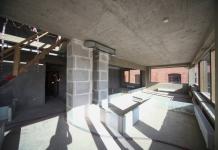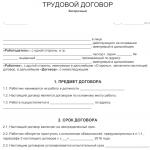After the adoption of the law on apartments, it will be possible to register in them, promised Deputy Minister of Construction and Housing and Communal Services of the Russian Federation Nikita Stasishin. He also noted that the construction of apartments will be regulated by the same law 214-FZ, which applies to shared-equity housing construction.
The Ministry of Construction published a draft law equating apartments to ordinary apartments in early October. The document introduces the concept of a multifunctional building, in which both non-residential and residential premises - apartments - can be located.
The bill defines apartments as “structurally separate premises in a multifunctional building intended for the residence of citizens and their satisfaction of household and other needs associated with their residence.”
The same norms of the Housing Code will apply to apartments in multifunctional buildings as to residential premises in multi-apartment buildings.
Owners of non-residential premises in buildings commissioned before January 1, 2019 will be able to transfer these non-residential premises into apartments until December 31, 2021. The procedure and conditions for such a transfer should be determined by regional authorities. The Ministry of Construction only requires to ensure “the safety of citizens’ permanent residence in such premises and the safe operation of such premises.”
The new law will be a pleasant surprise for many apartment owners. Today, the share of this type of real estate in the Moscow new buildings market is 20−25%. Last year alone, about 800 thousand square meters of apartments were put into operation - twice as much as the year before.
This type of real estate is cheaper for both the developer and the buyer than ordinary apartments due to reduced regulatory requirements - for insolation, sound insulation, and sanitary standards. And there are no requirements for social infrastructure for apartments at all.
Cost of 1 sq. m of apartments turns out to be 30-50% lower than in normal apartments. In conditions of declining incomes, this is often a decisive factor for buyers.
However, there are a number of other problems associated with apartments. In particular, utility and tax payments for this type of property are calculated at rates that are 15-20% higher than for ordinary apartments. But the main problem is that apartment owners cannot obtain permanent registration and, accordingly, be attached to clinics, schools, kindergartens and other social infrastructure.

Photo: Portal of the mayor and government of Moscow
Long story
Discussions about the need to recognize apartments as housing have been going on for several years. However, they all rested on the non-compliance of the apartments with the standards established for residential premises. The situation began to change only this year.
In April, Prime Minister Dmitry Medvedev, reporting to the State Duma on the work of the Cabinet of Ministers, called for intensified work in determining the status of apartments by improving housing legislation.
In June, Deputy Mayor of Moscow for Urban Development Policy and Construction Marat Khusnullin said that the Moscow government was preparing amendments to legislation that would equalize the status of apartments and housing.
In September, the Institute of Urban Economics sent proposals to the Ministry of Construction and Housing and Communal Services of the Russian Federation to amend the Housing Code to recognize apartments as one of the types of residential real estate. In fact, these proposals formed the basis of the bill published by the Ministry of Construction.
The main advantage of this document is the right of apartment owners to register and use the social infrastructure at their place of residence. However, some restrictions will remain.
According to sources, authorities are going to maintain increased property tax rates and utility rates for apartments.
In addition, not all existing apartments will receive the status of residential premises. Premises located adjacent to existing industries, especially hazardous ones, will be deprived of this opportunity.
In any case, apartment buyers must take into account the risk that their neighbors may, if they wish, engage in commercial activities - for example, open a sewing shop, a dental office or a restaurant, rent out their apartments to anyone, that is, make their neighbors’ stay very uncomfortable.
Due to such restrictions and risks, the price of apartments, even after the new law comes into force, will remain lower than the cost of normal apartments. But, most likely, not by 50%, but only by 10-20%.
For realtors and developers, the new law could become a serious headache, since a large volume of new supply will enter the Moscow residential real estate market. In September, Moskomstroyinvest estimated that of the 800 thousand square meters of apartments being built in the capital, almost 30% are on land allocated for hotels, and another 20% on land allocated for buildings for temporary residence. So the decline in prices for capital housing will continue at an accelerated pace, especially in the budget housing segment.
Apartments are traditionally associated with a higher class of housing, giving the owner additional space and comfort, but the desire to live in this type of premises will entail significant difficulties due to the location of the property and its features that do not fit the definition of residential premises.
However, according to the laws of the Russian Federation, every citizen is required to register at the place of residence, which means registering in apartments causes a number of difficulties.
What is considered an apartment?
Apartments are a special class of housing that has recently appeared on the Russian real estate market, differing from the usual houses and apartments:
- these are special parts of commercial premises, specially equipped by the construction campaign for living;
- since such premises are usually located in high-rise buildings in large cities and involve renting out premises, apartments can become a profitable and high-status investment for the resident in prestigious housing in the city center;
- location in a commercial building not intended for permanent residence will be an obstacle to obtaining permanent registration;
- In the apartments it is possible to obtain temporary registration for a period of up to 5 years.
Possibility of registration
Dear readers! The article talks about typical ways to resolve legal issues, but each case is individual. If you want to know how solve exactly your problem- contact a consultant:
APPLICATIONS AND CALLS ARE ACCEPTED 24/7 and 7 days a week.
It's fast and FOR FREE!
Obligations for registration of citizens are regulated by the laws of the Russian Federation:
- according to Federal Law No. 5242-1, a citizen of the Russian Federation is obliged to register at the place of stay and place of residence within the Russian Federation;
- Government Decree No. 713 establishes mandatory deadlines for completing the registration procedure when moving to a new place of residence, which for a temporary type of registration is 90 days;
- Article 16 of the Housing Code of the Russian Federation establishes premises classified as residential. According to it, a residential building is recognized as a building that consists of rooms, as well as premises for auxiliary use, intended to satisfy citizens’ household and other needs related to their residence in such a building.
According to the law, a citizen is required to have registration at the place of residence, but apartments located in a commercial building are not officially residential premises intended for permanent residence.
This problem can be solved in two ways:
- The ban applies only to permanent registration. It is possible to register in an apartment using a temporary type of registration, just like in a hotel or sanatorium. In this case, the applicant must have permanent registration in another premises recognized as residential.
- If a citizen needs to obtain permanent registration in an apartment, he can carry out the procedure for transferring the premises to housing stock.
Temporary registration in the apartment
Temporary registration in the apartment will help resolve the registration issue. It must be issued within ninety days from the date of arrival and can be extended upon expiration.
Registration is carried out in the territorial departments of the FMS (Federal Migration Service), MFC (multifunctional centers) or through the State Services portal.
Stages of registration through the Federal Migration Service or MFC:
- collecting a package of documents, you need to take care of having copies of documents certified by a notary;
- contacting the MFC no more than 90 days after arrival. You can contact and go through the live queue or use the institution’s phone number to make an appointment for a specific time, this will help reduce the call wait several times;
- waiting for registration. Takes 3-10 business days;
- receive documents from the MFC.
Stages of registration of temporary registration through State Services:
- on the website or in the “State Services” application, select the item “Registration of a citizen at the place of residence”;
- select the type of service received – electronic service;
- fill out the proposed application;

- wait for the notification that will be sent by the method specified by the applicant (email, call, personal account of the State Services portal). It will indicate when the applicant must visit the department of the Main Department of Migration Affairs of the Ministry of Internal Affairs to provide original documents;
- At the appointed time, you need to come with the original documents and, after verification, receive a registration document.
If the apartments are located on the territory of a hotel or hostel, it is possible to entrust the administrator to handle the temporary registration.
What documents are needed
Registration of temporary registration with a full set of documents will not take much time. To apply, you will need to provide:
- passport or military ID (for military personnel);
- on providing registration at the place of stay, indicating minor children, if any;
- birth certificate (for children under 14 years of age, children over 14 years of age submit a separate application);
- documents confirming ownership of the premises; if a copy is provided, it must be notarized;

- 3 copies filled out by officials;
- the landlord's consent to move in;
- premises for occupancy.
Duration and cost
Temporary registration is issued within no more than 10 working days, as a rule, the waiting period is 7 working days; through the State Services portal the registration is faster, taking 3 working days.
According to the legislation of the Russian Federation, registration of citizens at the place of stay and place of residence is free of charge.
Transfer to housing stock
Since apartments located in commercial buildings or hotels, according to the laws of the Russian Federation, do not fit the definition of residential premises, it is possible to begin the procedure for registering them as housing stock.
It involves a number of difficulties and takes a lot of time, but allows the owner and other persons to apply for permanent registration.
- isolated room;
- the premises have all the communications necessary for life (electricity, ventilation, heating system, gas and water supply);
- meets sanitary and epidemiological standards;
- is not subject to seizure, foreclosure or pledge;
- owned by an individual or legal entity.
A commission will check the premises for compliance with the specified requirements, so care should be taken to comply with the terms of the transfer in advance.
The district administration is in charge of transferring non-residential premises into housing stock. The applicant must contact the housing department or the urban services department with a package of documents:
- application to change the status of the premises;
- documents for ownership of residential premises or their notarized copies;
- technical plan of the apartments and the building itself;
- reconstruction and redevelopment project, if work was carried out on the premises to comply with the necessary requirements;
- authorities may also request additional documentation depending on the individual case being considered (usually this concerns the conclusion of a particular commission on the compliance of housing with the requirements).
If the documents are completed correctly and there are no violations of the requirements for designating the premises as residential, the application will be considered within 45 days, and they are required to notify the applicant of the decision within three days after its adoption.
An applicant may be refused registration of an apartment as a residential premises in the following cases:
- provision of an incomplete package of documents;
- non-compliance of the premises with sanitary-epidemiological or communication standards;
- location of apartments in a technical building;
- location of the premises in an industrial real estate facility. Such objects cannot be transferred to the status of residential premises; the described procedure is only available for apartments located in a hotel-type building.
If the commission makes a positive decision, the apartments are recognized as residential premises, and the owner has the right to carry out permanent registration and other actions available for transactions with residential premises.
Apartments are a relatively new type of high-status housing on the Russian market, so problems are still arising with registration on its territory at the moment.
The legislation simply did not provide for the possibility of considering such a premises as an object of permanent residence, which means that the rules for conducting communications and equipping such premises, and accepting this type of housing as residential by the commission cause difficulties for future owners.
New legislation regarding apartments is due to be reviewed by government authorities soon and will make registration easier in the future, but no such decision has yet been made.
Video: Apartment and apartment, what is the difference? The difference between apartments and apartments
Is it possible to register in the apartment? When they talk about living in an apartment or in a residential building, it seems something obvious. Is it possible to live in practically non-residential premises? It seems that the obvious answer is no. But in reality the situation is different. In some special cases, it is not only practically possible to register in a non-residential premises, but it is also permitted by law to obtain official temporary registration. Here we describe apartments in which registration is not always possible. What are they and what rights do the citizens living in them have? What is attractive about living in such places?
Before talking on this topic, it makes sense to understand what registration in an apartment actually means. When builders commission commercial real estate, they naturally provide premises for business. However, in addition to them, there are premises that would practically be fairly classified as non-residential.
It is not difficult for a construction organization to bring the necessary communications here, build walls, install doors and windows. After this, a real opportunity for living is created in this place. These apartments can have a private owner, they can be sold or bought, and they can be lived in almost the same way as in ordinary apartments. However, there is one significant difference. The problem is that it is impossible to register permanently in such premises. In particular, this means that registration in this housing cannot be done for longer than five years at a time. After the expiration of the period, you will need to re-apply for registration.
During the registration period, citizens living here acquire the same rights as those registered in ordinary apartments.
Those living in such places have the right to medical care, can send their children to kindergarten, have the right to pension services, and so on.
It is important to note that apartments can be located in different types of buildings:The legislative framework on the basis of which issues related to living in apartments are considered is Law number 5242-1 and Resolution 713. It is clearly defined here that apartments are not suitable for permanent residence. In a sense, the same rules apply for this type of housing that apply for registration in sanatoriums or hotels, where permanent registration is also not allowed.
- buildings that can be classified as industrial;
- those located in buildings that are similar to hotels.
Their location determines both their advantages and their disadvantages.
As you know, the demand for such premises is quite high. What advantages do they have?

- First of all, when buying an apartment, the buyer pays a lower price per square meter.
- Due to various circumstances, such housing is more affordable than regular housing.
Unfortunately, it also has its drawbacks.
- Utilities here are much more expensive than for conventional apartment buildings. This is due to the fact that apartments are classified as commercial real estate, and usually such services are supplied at prices for commercial legal entities.
- Accommodation fees are also much higher than in a normal situation. This happens for the same reason as in the previous case. Space in commercial buildings is assessed at different rates than residential.
- In addition to the above, the infrastructure in such places is not always at the proper level. This issue is carefully controlled during the construction of apartment buildings, but when constructing commercial buildings, the infrastructure is somewhat different.
- When purchasing apartments, you will need to pay taxes on them. Premises in the commercial sector pay a higher rate than usual.
- The state protects the interests of real estate shareholders, but this applies to the residential sector. Apartments are not included in this category.
You need to take into account all the positive and negative aspects of purchasing this type of housing and only then make your decision.

Before thinking about this, you need to contact the developer and read the documentation for the house the buyer is interested in. In it you can accurately determine the purpose of the built house and the possibility of registering in it. If we are talking about a hotel-type facility, apartments may be suitable. If we are talking about an industrial building, it is very risky to get involved with it. It may turn out that it is impossible to obtain not only permanent, but also temporary registration there.
If anyone expects to register themselves permanently while living in an apartment, then the answer is clear: this is impossible. However, temporary registration is not only possible, but also quite real. In order to study this issue more carefully, it is worth reading the Housing Code of the Russian Federation.
The different types of residential premises are listed there:- A detached residential building or part of it.
- An apartment in an apartment building, as well as part of such an apartment.
- Separate room.
As you can see from the list presented, apartments are not included. Therefore, there is reason to believe that this is a non-residential premises.
One of the popular options for those living in such housing is permanent registration in their home and temporary registration in an apartment.
If the premises are located in a hotel-type building, then most likely there will be no problems with a temporary subscription.
If this building was built for industrial purposes, then there is a high probability that it will not be possible to obtain any registration. In this case, there is only one way out: to move the premises from non-residential to residential. However, this procedure is complex and troublesome. It makes sense to start it only if there are sufficiently serious reasons. If the hassle ends successfully, you will have to re-register the property and only then will you be able to apply for registration.

Where to start obtaining a residence permit?
To do this, you will have to contact the registration authority:- You will need to obtain an application form and fill it out. It is best to do this under the supervision of an employee.
- You need to prepare and submit the necessary documents.
- After this, the package of documents is handed over to the registration authority employee.
- After this, you will need to wait a few days and come to receive a certificate of temporary registration.
No state duty is paid. Since we are talking about temporary registration, the resident will not have to be discharged from the place of permanent registration.
Registration can be done in various ways:- Use the services of the Multifunctional Center.
- Registration can be done via the Internet by visiting the State Services website.
- Since apartments are usually part of a hotel-type business property, there are most likely special employees who are involved in the temporary registration of guests. Apartment residents can also contact them to register their registration.
- As mentioned above, you can directly contact the registration authority at the place of registration.
To carry out the procedure, certain documents will be required. This is a passport, arrival sheet, title documents for the apartment. A corresponding application must also be filled out on a special form.
 Why is it difficult to register in such premises? Is it just a matter of whether the buildings were originally built for some other purpose or something else? There are actually several sides to this issue. First of all, purely industrial buildings cannot be converted into housing without very significant efforts. Therefore, it will not be possible to obtain even a temporary registration in them, and not just a permanent one. That is, someone, having purchased an apartment, receives ownership of a room with an original layout with connected communications, but cannot register in it under any circumstances. How commercially attractive does this option look? Typically, such purchases are made by businessmen who want to settle in a convenient place and have a sufficient level of income to do so. They usually already have registration at their main place of residence.
Why is it difficult to register in such premises? Is it just a matter of whether the buildings were originally built for some other purpose or something else? There are actually several sides to this issue. First of all, purely industrial buildings cannot be converted into housing without very significant efforts. Therefore, it will not be possible to obtain even a temporary registration in them, and not just a permanent one. That is, someone, having purchased an apartment, receives ownership of a room with an original layout with connected communications, but cannot register in it under any circumstances. How commercially attractive does this option look? Typically, such purchases are made by businessmen who want to settle in a convenient place and have a sufficient level of income to do so. They usually already have registration at their main place of residence.
A different situation arises when the building was built for a hotel. Here temporary registration is quite possible. Thus, a person receives an original property in one of the central districts of the city and a temporary residence permit to live here. As is known, the maximum period for temporary registration is five years. Each time after its expiration, registration in the apartment must be renewed.
The most difficult and unlikely way to register in an apartment is to try to convert non-residential real estate into residential property. This is a troublesome and very complicated matter. The probability of successful completion is very low. But if you eventually do this, you will have the opportunity to obtain not only temporary, but also permanent registration.
However, implementing the latter method has its pitfalls. The fact is that in order for real estate to be classified as residential premises, it must meet certain criteria. Among them, we can point out sanitary, fire safety, noise insulation and other properties that must meet certain standards (which in the case under consideration is very problematic). In addition to this, there are also a number of other rules. For example, the bathroom, toilet and kitchen should not be in the same room.
Before applying for the transfer of premises to housing stock, it is necessary to understand to what extent this premises complies with the established rules and to what extent it is possible to ensure this compliance.
A few more reasons why you can’t register in an apartment:
- An important requirement is to maintain the temperature in the cold season not lower than a certain norm. Often these types of rooms have a large cubic capacity of air. This leads to the fact that they do not warm up well and quickly lose heat.
- A separate issue is meeting the requirements for room ventilation.
- One of the important conditions is to ensure the appropriate level of insolation.
If the requirements are not met, it will be necessary to draw up a plan for the reconstruction of the apartment in such a way as to eliminate the existing deficiencies. After this, the prepared package of documents is submitted to Rosreestr, where a final decision is made within 10-12 days. This package usually includes an application, a diagram of the entire building, a diagram of the apartment itself and title documents.
Of course, it is up to the buyer to decide whether or not to purchase this type of real estate. However, it makes sense to note that although such housing is beautiful and original, although it is usually located in the central areas of the city and has an impressive design, a number of serious difficulties are associated with it. This includes an increased volume of payments, higher taxes, and in some cases we are talking about living without registration, which is undesirable. In addition, these premises are not considered residential for a reason, and, in particular, because they violate various standards that are accepted for any normal housing.
According to Russian law, apartments are not considered residential premises, which is why citizens living in them cannot obtain registration
Alexander Sidyakin (Photo: Alexander Shalgin / TASS)
A bill has been submitted to the State Duma, which, if adopted, will equate apartments to housing; information about this appeared in the System for Supporting Legislative Activities of the Lower House.
The author of the bill, First Deputy Chairman of the State Duma Committee on Housing Policy and Housing and Communal Services Alexander Sidyakin, proposes to determine the legal status of apartments and, in addition, “to establish a legal mechanism for the transfer of non-residential premises used for permanent residence of citizens and located in previously constructed non-residential buildings into residential premises for the transition period."
Now the apartments do not belong to the housing stock, which means that registration at the place of residence in them is not possible. In addition, the explanatory note says, such facilities are not provided with social infrastructure. The bill proposes to develop a mechanism for transferring apartments to residential premises.
“The above-mentioned innovations proposed by the bill will make it possible to introduce into the legislative mainstream new, spontaneously emerging segments of the housing market with a special legal status,” the explanatory note says.
The opportunity to register is one of the components of the bill, Sidyakin told RBC. The draft law proposes to “globally regulate the legal status of apartments,” he explained. “[We need to] understand what rights will be available to people and what rights will not be available. I propose to regulate some of them at the regional level,” the deputy said.
“Apartments are not housing stock in accordance with some rules and regulations,” Vladimir Starinsky, managing partner of the Starinsky, Korchago and Partners bar association, told RBC. According to him, this is due to the level of insolation - light entering the premises. “Since during the construction of apartments dense building is allowed or, for example, according to the window-to-window principle, this level is not maintained. Secondly, the construction of apartments does not comply with the standards for the construction of social infrastructure: schools, kindergartens, hospitals. Because from the point of view of legislation, this is premises that are purchased not for housing, but for, for example, office space. Therefore, neither the municipality nor the developer should provide social security facilities for the apartments,” he said.
According to the lawyer, in fact, people buy apartments specifically for living. “The migration issue is also important, because it is impossible to register in the apartments, problems may arise with opening bank accounts, etc. In addition, neither the Civil Code nor the Housing Code have such a concept. As a result, there are apartments, but this type of property is not regulated by law,” he added.
According to Alexander Loktionov, head of the development department of the State Unitary Enterprise VTsKP “Housing Economy” of St. Petersburg, by transferring apartments to housing stock, people will be able to expand the “ownership bonuses” of such premises by receiving benefits. “Those who live there [in the apartments] do not have exactly equal rights with those who, for example, originally lived in the neighboring house as a living space. They are hostages of commercial interests, since initially it was profitable for the developer to build premises without proper social infrastructure,” he explained.
If the bill is adopted, the cost of apartments will increase by 15-20%, managing partner of Zenith Property Management (Zenith Management Company) Ilya Andreev told RBC. “Developers are engaged in providing infrastructure and incur significant costs primarily for kindergartens and schools. The cost of one school is about 1.2 billion rubles. Accordingly, when apartments are transferred to housing stock, the cost of such premises will inevitably rise in price,” Andreev said.
At the same time, the expert clarified that only part of the apartments will become more expensive. “In total, apartments have two categories: so-called apart-hotels, in which finished rooms are sold at retail, and “pseudo-housing.” Hotel rooms will not become more expensive, since their cost is formed solely from profitability,” Andreev explained.
The MP called for permission to register in the apartments in September last year. After this, the relevant document was prepared by the Ministry of Construction.
The Moscow Committee for Ensuring the Implementation of Investment Projects in Construction and Control in the Field of Shared Construction (Moskomstroyinvest) said on April 2 that even if people are allowed to register in the apartments, the authorities will not consider the apartments to be residential premises.
Approaching European standards today concerns not only the quality of construction. Many developers prefer to build buildings with so-called apartments. They are very popular among high-income buyers. The apartments are fashionable, comfortable and cozy. But the problem arises when it comes to registration.
What are apartments
Premises that are not part of the housing stock. For the most part, these are rebuilt office premises in the center of the capital.
Usually these are spacious rooms in which the living room and kitchen are connected, and the bedroom can be located on the second level or as a separate room.
The area of such premises is usually very large, so those who have above-average income can afford the purchase. Today, it’s not just former office spaces that are being converted into apartments.
Developers of high-rise buildings often prefer not spacious apartments, but apartments located on the upper floors and offering a bird's-eye view of the capital.
Registration in apartments
 In European countries, where apartments are much more popular than in our country, there is no concept of registration, so they have no problems with a stamp in their passport. There it is enough to buy or rent any premises and live in it, even if it is a former warehouse, no one will say anything.
In European countries, where apartments are much more popular than in our country, there is no concept of registration, so they have no problems with a stamp in their passport. There it is enough to buy or rent any premises and live in it, even if it is a former warehouse, no one will say anything.
Note: Issues regarding permanent registration of citizens of the Russian Federation are described by Federal Law No. 5242-1, Government Decree No. 713.
This cannot be done in Russia. Registration is required here. Based on it, it is possible to visit clinics, schools, and kindergartens. You can affix a registration stamp in Moscow and anywhere in the Russian Federation only at the address where the residential premises are registered. If the developer designates all the premises in the house as apartments, it means that it will be impossible to register there on a permanent basis.
It is possible to obtain a temporary registration for a year while living in an apartment, and then renew it permanently for 5 years. But this is inconvenient and impractical. That is why the Moscow government decided to reconsider the issue of the status of apartments.
Take into account: It is almost impossible to register in apartments on a permanent basis, since they are non-residential real estate (Order of the Ministry of Sports No. 35 of April 15, 2011 - apartments are one of the categories of rooms, not apartment buildings).
Apartment status
 The great popularity of apartments in the capital led to the government deciding to reconsider the status of these premises.
The great popularity of apartments in the capital led to the government deciding to reconsider the status of these premises.
At the beginning of 2015, it was proposed to assign the status of residential premises to the already constructed premises. This will allow residents to register and save on taxes.
Payment of tax on non-residential property is significantly higher than tax on residential apartments. In addition, residential utility rates are much lower in commercial options.
In order to come as close as possible to the implementation of Resolution No. 660-PP “On Amendments to Resolution of the Moscow Government of May 25, 2011 No. 228-PP,” which was adopted on November 11, 2014 by the Moscow Government, it was decided to introduce a ban on the construction of apartments, as separate buildings. Today apartments can be part of:
- apart-hotel;
- hostel;
- motel;
- hotels.
That is, only in those buildings where permanent residence is not provided, because an apartment is a non-residential real estate fund. To date, the law on transferring apartments to housing stock has not been implemented, so if they tell you that you can register in an apartment without any additional actions or collecting documents, then do not believe it. For now, the authorities have not recognized these premises as residential, which means registration is not possible.
How to register in an apartment
 When buying real estate, everyone plans to register in a given premises, unless, of course, it is a second or third apartment. If you liked the apartment because of its spacious layout, good location, and you plan to register there, then you should know that there are only two ways to register in the apartment:
When buying real estate, everyone plans to register in a given premises, unless, of course, it is a second or third apartment. If you liked the apartment because of its spacious layout, good location, and you plan to register there, then you should know that there are only two ways to register in the apartment:
- obtain temporary registration for a year, and then renew;
- prove through the court that this is a residential premises, and only then register.
It is important to know: With temporary registration, problems may arise with admission to kindergarten and school, as well as when going to the clinic. Plus, it will have to be constantly renewed.
To prove that the apartment you purchased is suitable for living and can be recognized as a residential property, you will need to collect a lot of documents. And then present them as evidence to the court. Such documents are:
- application for transfer of premises from non-residential to residential;
- certificate of ownership;
- floor plan of the building where the apartments are located;
- floor plan of the premises;
- apartment project.




















